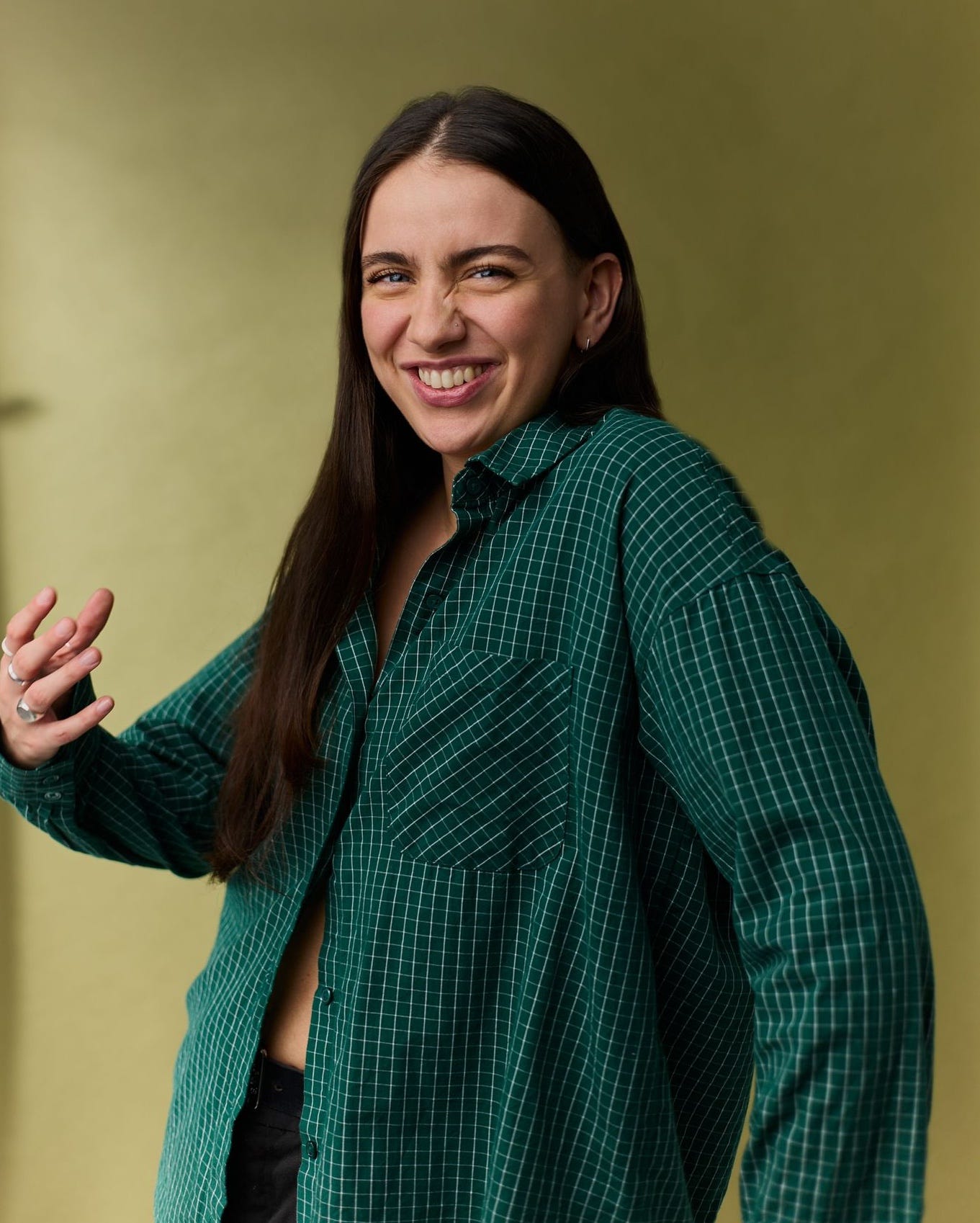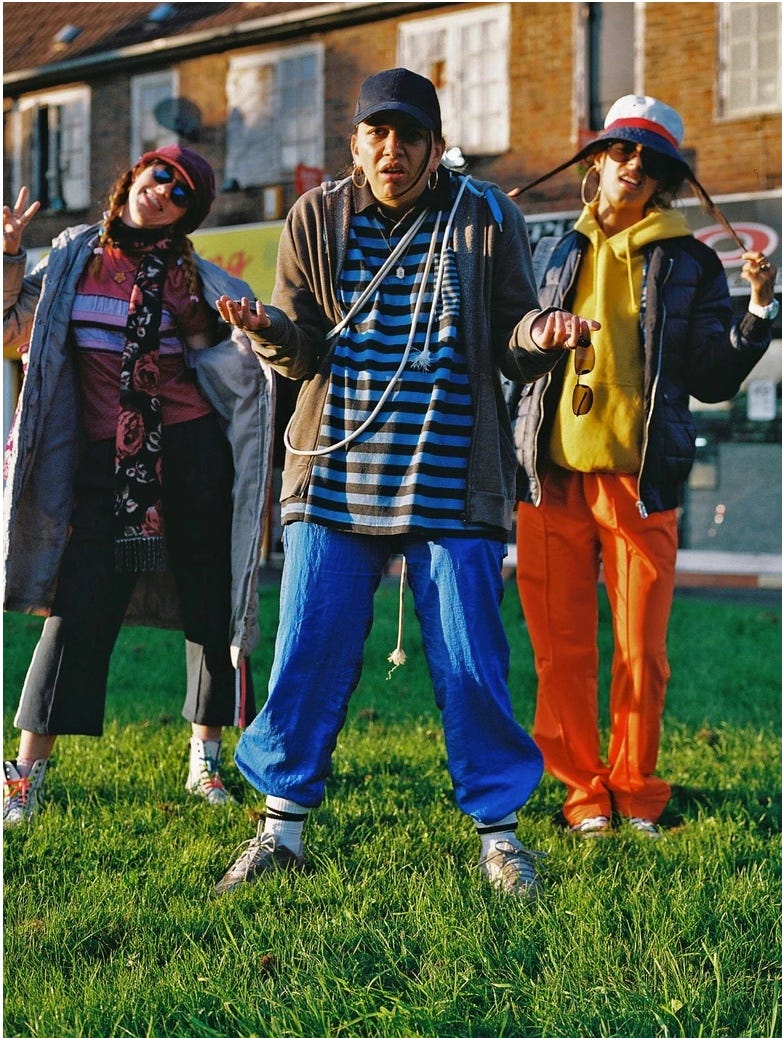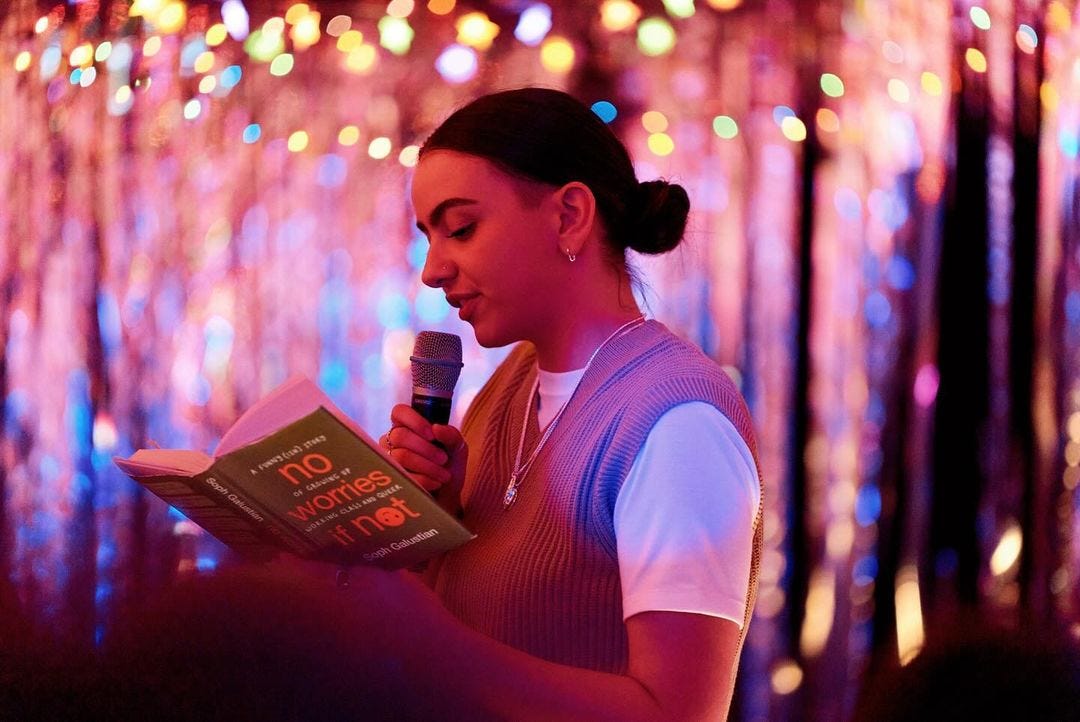Broadcasting: Soph Galustian
Comedian, actor, writer and author Soph Galustian shares her 14 years-and-counting love story, her desire to tell more queer stories and why she credits her success to an obsessive personality.
You might recognise Soph from her role as Julia in the Channel 4 sitcom, Everyone Else Burns, her BBC short-form comedy series, Peck ‘Eds, her evocative and poignant spoken-word poetry, or her very funny sketches as TikTok Lesbian. She’s a Funny Women 2023 finalist, and her debut stand-up show HEY MAMMAS sold out at Soho Theatre. As an author, she’s written her coming-of-age book, No Worries If Not: A Funny(ish) story Of Growing Up Working Class and Queer. It’s part-memoir, part an eclectic mix of illustrations, poetry and some musical throwbacks that will fling you right back to your own youth. It’s hugely relatable, very funny and sometimes sad.
The first time Soph came to my attention was in November 2020, and it was with this sketch. Set in 2008 on the outskirts of Manchester, Soph plays Chelsea-Leigh / Chel-Z, an 18-year old taking a film crew around her council estate. There’s something undeniably Mancunian about her sense of humour and I remember showing the video to my brother, whose response was, ‘we should film something like that’. Instead, we settled on a re-enactment of the Rowan Atkinson and Alan Rickman scene in Love Actually. I’m not sure when I got in the habit of publicising my half-hearted attempts at fame (see my previous post for more), but here the video is in all its glory. Weirdly, I’m still waiting for the call from Richard Curtis.
There are so many words I could use to describe my chat with Soph, but her truthfulness is what stands out to me. She is a refreshing combination in that she strikes me as very self-aware, yet totally non-judgemental about herself. There is no sense that she is self-editing, an openness that gives her writing and performing a unique quality. You’re in for a treat.
'“Nothing and no-one is one-dimensional. Anything has the potential to be funny, even the most heavy, daunting subjects. There are so many layers to every situation, and those are the stories I’m interested in telling.”

In your (brilliant) one woman show, you joke about ‘ticking all the diversity boxes’. What does your identity mean to you?
I really pride myself on my identity. It’s the driving force of everything that I do. I think because I spent so long trying to shy away from those elements of myself, like my sexuality and my class, it’s become even more important to me now. It upsets me to say, but in primary school I was embarrassed to have a dad who didn’t speak such good English. And, to be honest, because my parents split up when I was younger, I didn’t know anything about my dad’s Armenian heritage or our family tree or anything. I just knew that I caught a tan easily and I was a bit hairier than my friends! I think when you’re a kid it all comes down to ignorance and not wanting to stand out. But now I really want to be all of the things that I am and make them integral to everything that I do. It helps me feel like I’m rewriting the years spent rejecting all of those aspects of myself, which is really important to me.
I understand that - I used to lie to people in primary school and say I was Spanish instead of Egyptian, because it felt more palatable and I just wanted to fit in. Has your journey of acceptance been gradual or can you pinpoint a catalyst?
I think my work has been a big part of it. When you surround yourself with people who are activists, people who care about identity, people who stand up for social injustice, it really broadens your way of thinking and your own sense of self. Where I grew up there is quite a small town mentality, as you know, so I think a big part of it is just surrounding yourself with the right people. If you see someone else being proud of an aspect of their identity, it makes you feel like you can be too. I don’t know if there was a specific time, but maybe moving to London was when the journey really started. I’ve since moved back to Stockport, and I think being home fulfils me in so many ways, but that initial move to London was quite instrumental for my career. I think, as time continues to pass, I get more and more to that point of - acceptance is the wrong word - but understanding of my identity, maybe?
You first gained a following as a comedian and performer on social media, so it’s fair to say that it’s been pretty crucial for you. Is there a negative to that, though?
I wouldn’t be where I am without social media. So I am very grateful to it. But I can get really wrapped up in it; I will often compare myself to other people doing similar things to what I want to do, and I find myself getting jealous of them. Sometimes that’s good because it can encourage me to keep working hard, but other times I can feel really defeated. So I do have to be careful to try and manage that. But I do like to think that one day, if I reach a certain level of success and guaranteed work, I could delete it all. Maybe I could be one of those people that lives a low key life and just wakes up and wraps up and goes for a little walk in the fresh air. Even as I’m saying that, I’m like…would I really do that though? I’m too much of an attention seeker!
Something I love about your book is how honest you are about the amount of celebrities you messaged on Instagram asking them to share your poems. Rather iconically, the list includes Beyoncé, Alan Sugar, Cardi B and Matt Cardle (throwback). They might not have responded (gutted for Alan), but Daisy May Cooper did, sharing your video to her own page. Were you embarrassed when you started sharing your content, or did you just think, fuck it?
I was definitely embarrassed, but I think the fuck it feeling was stronger! I was just so fed up of trying and not getting anywhere. I’ve always known that I enjoy being creative and making people laugh, and I’ve always wanted to be on the telly. When I was younger, I’d look up writers and actors that I admired and I’d be like, oh, they went to Oxford, or their uncle’s a director. It’s so disheartening when all you want to do is work in an industry that favours the rich and well-connected, especially when you’re not that. And it’s so ingrained in you as a working class person that all of that is unattainable.
At a certain point, I had to put my embarrassment on the back-burner and just go for it. I think if you lead with embarrassment then you’re not going to get anywhere, because everyone feels embarrassed! If you share something and it doesn’t get many likes, or you email someone and they don’t get back to you, it is embarrassing, but you just have to lead with determination instead. I’m not embarrassed to say how much it helped my career that Daisy reshared my work. If I hadn’t swallowed that embarrassment and sent her that message, I’d be closing off that opportunity to myself.
You touched on that feeling that - as a working class person - success in this industry can feel ‘unattainable’. Do you think a lot of that comes from the media’s portrayal of a working class upbringing?
I think working class communities are always painted with this grey, depressing brush. Even visually, I swear they put a grey sheen on it! If you’ve actually grown up in a council estate then you’ll know it’s not like that. It’s full of community and togetherness and support. Yes, there’s hard shit, but it isn’t always doom and gloom. I feel like people love to talk about the ‘richness’ of working class experiences - I hate that phrase, because we are more than our ‘gritty’, working-class roots. It’s a part of who I am and I’m proud of it, but nothing and no-one is one-dimensional. Anything has the potential to be funny, even the most heavy, daunting subjects. There are so many layers to every situation, and those are the stories I’m interested in telling.
Reading your book and speaking to you now, you strike me as a very motivated and determined person. Where do you get that drive from?
I’m really obsessive, like I’ve got an obsessive personality. I think it’s that obsessiveness that motivates me. I want to go from strength to strength as an actor, a writer and a comedian. I want to have my own series and my own Netflix special, and I am obsessed with getting those things. It doesn’t even feel like something that's negotiable for me, because I know I won’t be fulfilled by anything else. Sometimes, like now, that drive can feel really inspiring. But, at other times, it’s the bane of my life! Like when I’ve not got an audition, or a commissioner has passed on an idea - those things feel like really hard knocks and I start to question whether I’m doing the right thing, whether this is what I’m supposed to do with my life, whether it’s meant to be so hard and take so long. Sadly, I think the answer is, yes. Yes, it is.

Do you ever feel like you’re not good enough?
All the time. I don’t think it helped that I started my career on such a high note. I got my BBC series of shorts commissioned, then a Channel 4 commission, then I was cast in Everyone Else Burns. All of those things happened in quick succession. But then something got dropped, I didn’t audition for a few months, and then I did audition but I didn’t get it. It’s in those moments that I’ll worry that it’s because I’m not as good as I was and I’ll start posting more on social media to re-engage people. But the truth is that it is just so up and down. It’s unpredictable and largely out of your control.
What helps me is reading about other people’s successes and the setbacks they’ve had. I find that really inspiring. I’m also such a believer that what’s meant to be will be. I believe that with my entire being. Apart from when you lose someone you love, I don’t think that’s meant to be in the same way. But in terms of how your life plays out, I think everything happens for a reason. When I think about me and my girlfriend Jasmine; the fact that we were in love with each other 14 years ago at school, and now we own a house together, that was obviously meant to be!
One of my favourite things about your book is the way in which you punctuate each year of your life with musical interludes, reflecting iconic songs from the time. It’s clear that nostalgia plays a huge part in the way you experience the world. Would you say that’s true?
Yes, I couldn’t be more nostalgic! And I think the reason I am is because such a huge part of growing up for me was being in love for the first time. So I think I’m always trying to relive that by remembering it all - the music, the perfume, the clothes - all of it takes me back to those intense feelings of being in love. The detail that I remember from that time of my life is wild. I look at people who are 14 or 15 now, and I think of them as babies, but then I remember the intensity of those feelings! It blows my mind that you can feel so much at such a young age.
Do you think you feel more intensely when you’re younger because there isn’t that societal pressure telling you not to express yourself?
I think so. And I think your first experience of anything is always going to be intense. And when you add a layer of repressed sexuality on top, it’s even more so. I was living a double life where anytime I spent with the person I loved was in secret. It was really difficult, but there were elements that were so thrilling. It felt addictive, and I think what’s why I’ve spent so much of my adult life thinking about that time. And to now be with the person who gave me those experiences is crazy! If you’d told 14 year old me that, I just wouldn’t believe it. This is honestly the cringiest thing I’ve ever said, but I feel like I spent so many years living on the edge of love!
Are those feelings something you’re keen to explore and reflect in the work you do?
Definitely. I really want to tell queer stories. Especially experiences of falling in love when you’re younger and what it’s like to try and navigate that. I’m not sure we ever really see those experiences unless they’re told from the male perspective. Those stories are so important, but there’s room for a lot more.
Ultimately, I want to tell stories that are relatable, truthful, meaningful, inspiring and funny. That is all I want to do. I want to follow in the footsteps of Sophie Willan who created Alma’s Not Normal. That series does all of those things. It’s one of my favourite shows ever because it’s so truthful. Most things that are brilliant are rooted in truth.
Follow Soph here, me here and RUN to buy Soph’s book, if you haven’t already. The paperback is out on April 25th!




